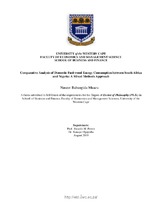| dc.contributor.advisor | Peters, Ricardo M. | |
| dc.contributor.advisor | Ogujiuba, Kanayo | |
| dc.contributor.author | Muazu, Naseer Babangida | |
| dc.date.accessioned | 2020-11-12T11:25:54Z | |
| dc.date.available | 2020-11-12T11:25:54Z | |
| dc.date.issued | 2019 | |
| dc.identifier.uri | http://hdl.handle.net/11394/7473 | |
| dc.description | Philosophiae Doctor - PhD | en_US |
| dc.description.abstract | South Africa was considered to have attained universal access to modern energy, this meant that the number of households that have access to energy had successfully increased from 30% in 1994 to 87% in 2012. However, the situation in Nigeria is such that electricity generating figures are very poor and they cannot meet half of the demand of Nigerian households, and the majority of the states have challenges in accessing sufficient fossil fuels. However, recent trends in domestic energy consumption for both countries are becoming biased in favor of fuel-wood energy especially among low-income households, “descending the energy ladder”. | en_US |
| dc.language.iso | en | en_US |
| dc.publisher | University of Western Cape | en_US |
| dc.subject | Fuel-wood energy | en_US |
| dc.subject | Consumption | en_US |
| dc.subject | Socioeconomic variables | en_US |
| dc.subject | South Africa | en_US |
| dc.subject | Nigeria | en_US |
| dc.title | Comparative analysis of domestic fuel-wood energy consumption between South Africa and Nigeria: A mixed methods approach | en_US |
| dc.rights.holder | University of Western Cape | en_US |

